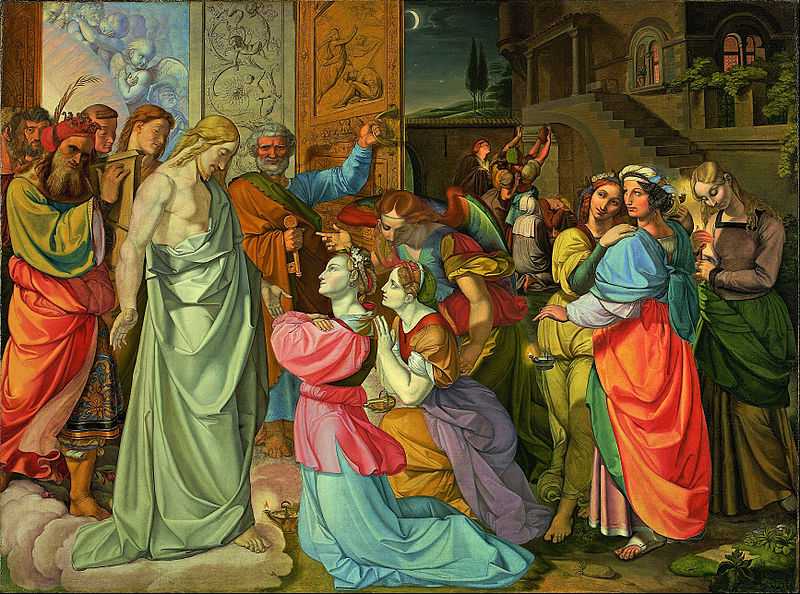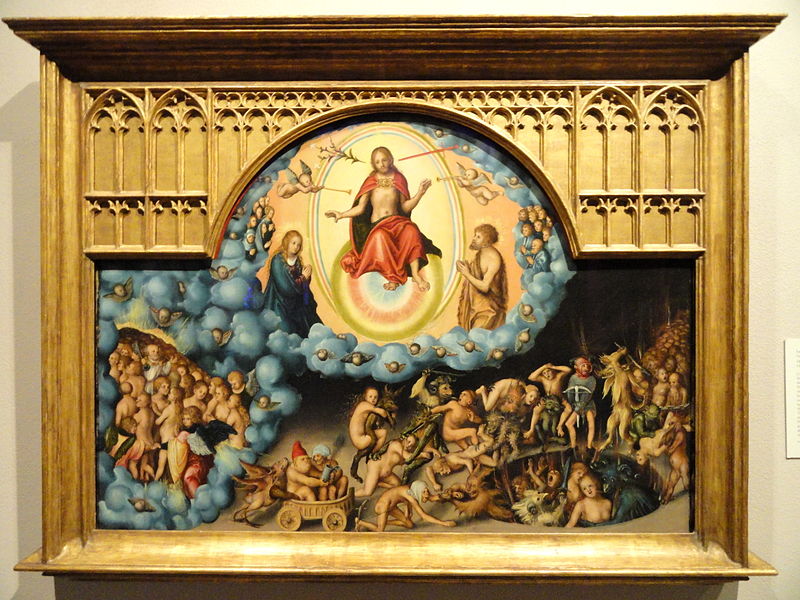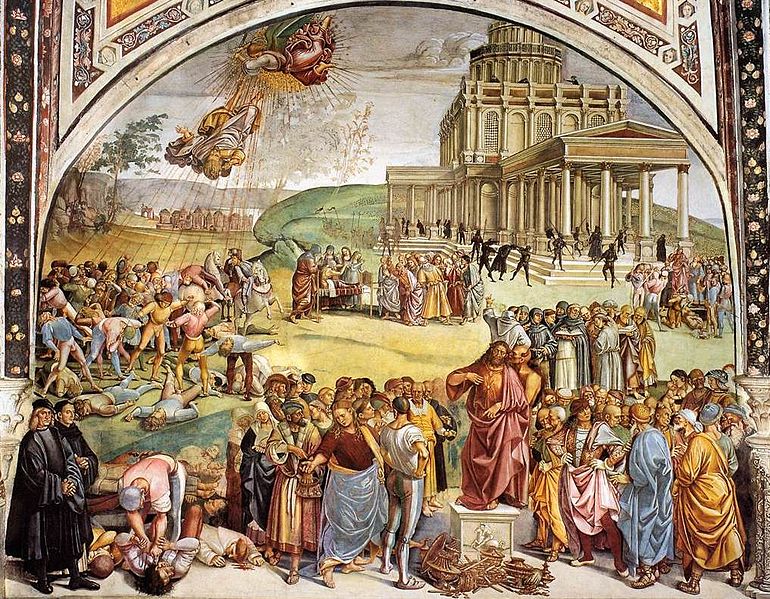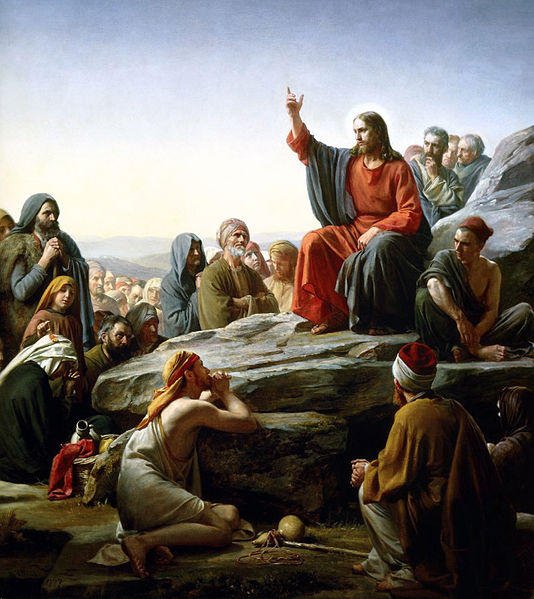November 24, 2019
These ten virgins are what we today might think of as bridesmaids. Their job is to attend to the bridal couple at the wedding and of course to celebrate with them at the wedding feast. At the time when Jesus first told this parable, it was customary among the Jews for the bridegroom to go and prepare the marital home while the bride remained in the home of her parents. When the bridegroom had finished preparing the house, he would go and get his bride and bring her back to their new home and everyone would celebrate with them there. This is what these ten virgins are waiting for. But there is no set time for when the bridegroom will return. Perhaps he’ll finish up midmorning. Perhaps he’ll be done in the middle of the night. Yet, whenever he comes, the virgins must be ready to accompany the bridal couple and celebrate with them. This is why they brought lamps.
Jesus tells this parable to teach us about the kingdom of heaven, specifically, that the return of Christ and his visible kingdom will come at a time you will not expect, so you must be ready day or night. We are the virgins, the bridesmaids, who are to accompany Christ Jesus the bridegroom as he enters into the house to celebrate his union with his bride, the Church; a union, which will have no end.
The wise virgins are ready when the bridegroom comes. They are ready, because they have oil, both in their lamps and in their flasks, so that they can light their way even in the darkest hour of the night. Their oil is their wisdom. The foolish virgins are not ready. They had no oil, that is, they had no wisdom. The wise virgins entered into the wedding feast to celebrate, that is, they entered heaven. The foolish virgins were denied entrance. The door was already closed. The bridegroom said that he did not know them. The foolish virgins went to hell.
Wise and foolish, wisdom and folly: this is a great theme in Scripture. The wise enter eternal life. The foolish enter eternal punishment. But what is wisdom? What is this oil that leads to eternal life? And what does it mean to be a fool? What does it mean to have no oil?
Scripture says in a number of places, “The fear of the Lord is the beginning of wisdom.” So, in order to have wisdom, you must fear the Lord. Now, this fear does not mean to be scared of the Lord, per se. Yet, it does mean more than simply to respect him. To fear the Lord means to recognize that he is the creator of the heavens and the earth; he kills and he makes alive; he has authority not only to kill the body, but also to send your soul into hell; he judges the living and the dead on the Last Day! This fear entails more than just a fear of God’s limitless power, but also an earnest trust that God will provide you with what you need. Psalm 130 states, “If you, O LORD, should mark iniquities, O Lord, who could stand? But with you there is forgiveness, that you may be feared.” The LORD forgives all our sins therefore, we fear him. To fear the Lord is to see him as our Father from whom we receive all good things. Psalm 103 states, “As a father shows compassion to his children, so the LORD shows compassion to those who fear him.” And so, to fear the LORD means to recognize that the Lord is all powerful; that he provides all good things; that he tells the truth; that he judges; that he is the source of forgiveness and eternal life!
Yet, Scripture say, “The fool says in his heart, ‘There is no God.” (Psalm 14:1) This does not necessarily mean that the fool is an atheist, although, it is clear that to be an atheist is a very foolish thing. Rather, a fool lives as if there is no God; as if God is not watching; as if he does not judge. There is no fear of God before a fool’s eyes. It is important here to note that these foolish virgins with no oil look just like the virgins with oil. They are dressed appropriately and they have their lamps with them. No one knows who has oil and who doesn’t until the watchman cries in the middle of the night and only the wise are able to trim their lamps. The fool may go to church, he may call himself a Christian, he may say that he believes in God, but he does not fear God in his heart. He thinks and speaks and follows his heart without fear or trust in God.
The wise seek knowledge from God. Proverbs 9 states, “Give instruction to a wiseman, and he will be still wiser; teach a righteous man, and he will increase in learning.” Wisdom comes from hearing the word of the Lord. This is what fear of the Lord does; you want to hear and learn God’s word. This is why Jesus says, “My sheep hear my voice.” And Scripture also says, “Faith comes from hearing, and hearing through the word of Christ.”
But is important to notice, that wisdom is not just having a little knowledge stored somewhere in the back of your brain like, “George Washington was the first president of the United States.” or “The Green Bay Packers won the first two Super Bowls.” Wisdom seeks to gain more wisdom. Proverbs 4 states, “The beginning of wisdom is this: Get wisdom, and whatever you get, get insight.” To be wise means to continue to get more wisdom. We know that the devil, the world, and our sinful flesh are constantly pulling us away from Christ, away from our God. Living in this sinful world, it is impossible not to conform and become like it, unless we constantly hear God’s word and are filled with his wisdom.
Likewise, if you know anything about oil lamps you know that oil burns up! You must continue to buy more oil. If you do not, then your oil will burn up and run out! Likewise, when you stop hearing the words of Christ, when you stop listening to his voice, your wisdom runs out. Your faith in Christ dies. Yet, the wise desires to constantly hear and learn the word of God, to become stronger in faith, so that the enemies of God cannot drag you away.
Fools, on the other hand, have no desire to hear and learn the word of God. Rather, they ignore it and seek after knowledge that does not build up. Proverbs 18:2 states, “A fool takes no pleasure in understanding, but only in expressing his opinion.” And what a danger this folly is! How often do Christians ignore what the Bible says, saying things like, “Well, the Bible may say this, but I think...” Or, “I don’t know what the Bible says about that, but I think...” Who cares what you think? Your opinion is not helpful. God’s word is helpful! God’s word saves! St. Paul tells Pastor Timothy, “All Scripture is breathed out by God and profitable for teaching, for reproof, for correction, and for training in righteousness...”(2 Timothy 3:16) Yet, more and more Christians live like fools by not hearing and learning the word of God. They take no pleasure in understanding, but follow their own opinions or the opinions of others. This is not wise. To be wise it to gladly hear the word of God, to learn it, and to conform your mind to it. This is why we should go to church as often as we can to hear God’s word and learn from it; to read our Bibles and seek to understand what Scripture says, attend Bible studies and grow in knowledge.
The wise don’t just listen to the word of God. They do it. Jesus concluded his Sermon on the Mount saying, “Everyone then who hears these words of mine and does them will be like a wise man who built his house on the rock... And everyone who hears these words of mine and does not do them will be like a foolish man who built his house on the sand.” (Matthew 7:24, 26). Going to church every Sunday, even attending Bible studies regularly does not make one a Christian, if all you’re doing is hearing. The words must actually have an effect on your heart. You must believe them. And your faith must move you to live according to them.
The wise accept correction. The proverb says, “A wise son hears his father’s instruction, but a scoffer does not listen to rebuke.” (13:1) and another proverb says, “A rebuke goes deeper into a man of understanding than a hundred blows into a fool.” This tells us two things about the wise. 1. They are not perfect. The wise still sin. They fall short. They need salvation. And 2. The wise are humble. The wise, filled with wisdom from God’s word, accept rebuke and instruction. They know that they are sinners and desire God to correct and forgive them when they have done wrong. “Let a righteous man strike me- it is a kindness; let him rebuke me- it is oil for my head; let my head not refuse it.” (Psalm 141:5). This is true wisdom, to repent when you have done wrong; to accept rebuke and correction from God’s word.
Fools, however, scoff at rebuke and correction. They are not afraid of their own sins. Rather, by continuing in sin, they despise the sacrifice of Christ, which he made to take away sin. Whoever corrects a scoffer gets himself abuse, but he who reproves a wise man is loved by him. Through faith in Jesus Christ, we are able to accept correction and rebuke, to repent of our sins and try to do better even as we trust in God’s forgiveness. Yet, when our pride is so great that we cannot accept correction even from the word of God, then we prove ourselves to be fools and false Christians.
To be wise is to have the mind of Christ. Scripture says, “Have this mind among yourselves, which is yours in Christ Jesus, who though he was in the form of God, did not count equality with God a thing to be grasped, but made himself nothing, taking the form of a servant, being born in the likeness of men, and being found in human form, he humbled himself by becoming obedient to the point of death, even death on the cross. Therefore God has highly exalted him and bestowed on him the name that is above every name...” Philippians 2:5-10.
Wisdom is knowing Christ Jesus through his word. Put simply, to be wise is to trust in Jesus for forgiveness and salvation, to repent of your sins and look to Christ to make you whole. Wisdom does not center on your own good works, but on Christ Jesus and the work he has done for you. Christ humbled himself to the point of death to take away your sins and God highly exalted him to eternal glory. And Christ teaches us to humble ourselves, to repent of our sins and to ask him for his kingdom by grace. And God exalts us freely for Christ’s sake. To be wise is to trust in Christ.
The wedding banquet that awaits us will be pure joy. We want to be there. At that banquet we will enjoy our resurrected bodies without any flaw, or pain, or sickness. There will be no sin anymore and no enmity with another human. The creation will be so perfect that lions and wolves will get along with sheep and oxen. It will be truly as God intended. And greatest of all, Jesus, our Bridegroom will be there. We will see him with our eyes, whom we have held in our hearts for so long.
Jesus is with us here today through the preaching of his word. He is with us in the Sacrament of his true body and blood. The foolish do not see it. But the wise see it with eyes of faith. We receive Jesus now in faith. Through faith we know him and he knows us. This is how we know that when Jesus returns visibly, we will be received by him. He will certainly know us, as he will know all those who have faith in him. This Jesus promised when he said, “My sheep hear my voice, and I know them, and they follow me. I give them eternal life, and they will never perish, and no one will snatch them out of my hand. Amen.




 RSS Feed
RSS Feed